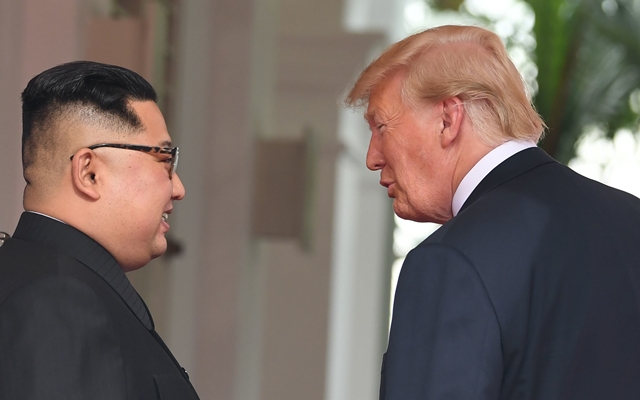 |
|
North Korean leader Kim Jong-un (left) and US President Donald Trump speak during the North Korea-US Summit in Singapore on June 12. (Yonhap News)
|
History shows that sanctions are rarely effective in solving conflicts
The first economic sanctions in human history were a failure. Why did the trade embargo imposed on Megara by Athens 2,421 years ago end up igniting the Peloponnesian War? While Athens viewed its Megara legislation as a “minor measure,” Megara read hostile intent. Far from evoking submission, the pressure only sparked anger. As the threat ignited fears, the sanctions led to war. The same is true for the sanctions frequently adopted in modern diplomacy. How effective are sanctions as a means of resolving the North Korean nuclear issue? The US moved on Sept. 1 to extend its travel ban against North Korea, declaring that sanctions would remain in place until denuclearization occurs. What effect does keeping the sanctions in place have on North Korea-US relations? To begin with, they are not in accordance with the “new US-DPRK relations” agreed upon by the two sides at their June 12 summit in Singapore. Sanctions represent the old-fashioned approach of using brute force to solve problems. Maintaining sanctions is contradictory to normalizing relations The continuing of sanctions also conflicts with their agreement to normalize relations. In legal terms, it is difficult to distinguish diplomatic ties from economic ones. Suppose North Korea and the US agreed to normalize their diplomatic relations and establish mutual liaison offices as a first step. Is it even possible to establish a liaison office with an “enemy” and “state sponsor of terrorism?” It is impossible to normalize relations while maintaining laws that classify the other side as an enemy. To declare that the sanctions are to be kept in place is tantamount to saying there will be no normalization of relations. Some have argued for keeping sanctions to ensure that negotiations go in a beneficial way. Sanctions certainly have had a negative impact on the North Korean economy. Comprehensive and specific as they are, the North Korea sanctions adopted by the UN in late 2017 are certain to have had a far more serious effect this year than last year. Sanctions do have the effect of pressuring North Korea, which is trying to focus on building its economy. This could translate into greater bargaining strength. But there is something sacrificed when sanctions are kept in place: trust. The reason North Korea and the US agreed at their summit to achieve denuclearization through “mutual confidence building” is because the brute force approach of the past was a failure. It’s difficult to fathom why they would seek to repeat the failures of the past after reaching an agreement on a new relationship, new beginning, and new history. What they stand to gain from keeping the sanctions are the same past failures; what they stand to lose is a historic opportunity. There’s a reason it is generally difficult to keep comprehensive sanctions going for a long time. Sanctions necessarily result in human suffering, and the biggest victims come from the most vulnerable segments of the population. Whatever the intentions, the policymakers in countries facing sanctions tend to use external threats as a pretext for strengthening their own authority – the rallying effect. But while the general trend in international politics has been to implement “smart sanctions” in place of comprehensive sanctions, the opposite has been the case for North Korea alone. The comprehensive sanctions are the product of a period of deterioration. Can the US really expect to win the support of the international community for calls to keep them in place during a time of resolution? So focused on the means that we lose sight of the end If the sanctions are to succeed, international cooperation is crucial – and that appears to be a tall order. The reason international sanctions against North Korea have had a practical effect is because of the participation of China, which accounts for over 90 percent of North Korea’s foreign trade. But the Donald Trump administration is currently waging a trade war with China. Escalating from retaliatory tariffs to financial sanctions and a battle for technological hegemony, the situation seems to offer no exit in sight. Is it possible to maintain international coordination while repudiating international cooperation? The US has its work cut out maintaining cooperation on sanctions amid its battle with China. With the mending of its ties with Pyongyang, Beijing has already shifted from rigorous implementation of UN sanctions to “normal implementation.” As long as North Korea continues not doing anything to aggravate the situation, China will be in a position to propose the inclusion of terms in UN resolutions that allow measures to be strengthened, revised, suspended, or lifted depending on what actions North Korea takes. The US-China trade war has opened the back door for North Korea.
 |
|
Kim Yeon-cheol, Director of the Korea Institute for National Unification
|







